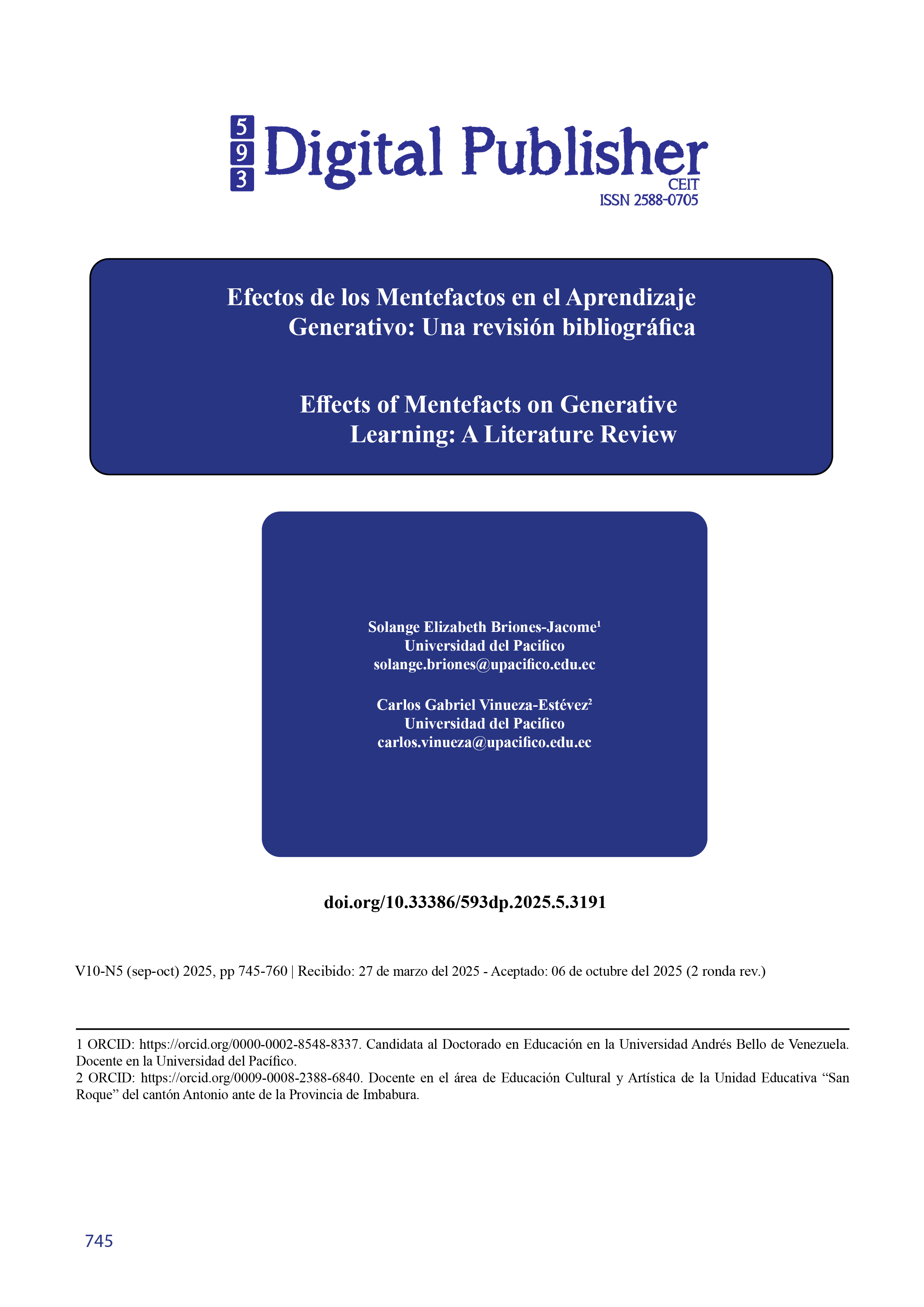Effects of Mentefacts on Generative Learning: A Literature Review
Main Article Content
Abstract
This literature review examined the use of mind maps in various educational contexts, analyzing their impact on meaningful learning, critical thinking, metacognition, and information retention. Through a review of previous studies, the benefits of mind maps were identified, especially in the visual organization and structuring of knowledge, which facilitated the integration of concepts and the transfer of information. The methodology consisted of analyzing several studies that addressed the implementation of mind maps in basic and higher education, focusing on how these tools could improve academic performance and promote self-regulated learning. The reviewed studies included quasi-experimental, correlational, and experimental research that demonstrated that mind maps favored information organization, reduced cognitive load, and contributed to the development of metacognitive skills. The results showed that mind maps improved the understanding of complex concepts, promoted critical thinking, and facilitated information retention. However, the effective implementation of mind maps was limited by a lack of adequate teacher training. The discussion highlighted that, to maximize their effectiveness in learning, it is crucial to provide adequate teacher training, which would enable educators to integrate mind maps efficiently and thus improve educational outcomes.
Downloads
Article Details

This work is licensed under a Creative Commons Attribution-NonCommercial-ShareAlike 4.0 International License.
1. Derechos de autor
Las obras que se publican en 593 Digital Publisher CEIT están sujetas a los siguientes términos:
1.1. 593 Digital Publisher CEIT, conserva los derechos patrimoniales (copyright) de las obras publicadas, favorece y permite la reutilización de las mismas bajo la licencia Licencia Creative Commons 4.0 de Reconocimiento-NoComercial-CompartirIgual 4.0, por lo cual se pueden copiar, usar, difundir, transmitir y exponer públicamente, siempre que:
1.1.a. Se cite la autoría y fuente original de su publicación (revista, editorial, URL).
1.1.b. No se usen para fines comerciales u onerosos.
1.1.c. Se mencione la existencia y especificaciones de esta licencia de uso.
References
Araujo Ferrer, F. R., & Valenzuela, L. (2021). El mentefacto argumental como estrategia didáctica para la enseñanza del pensamiento crítico en los estudiantes de ciencias políticas. Frónesis, 27(1), 44-74. Recuperado a partir de https://produccioncientificaluz.org/index.php/fronesis/article/view/35704
Atkinson, RC y Shiffrin, RM (1968). Memoria humana: un sistema propuesto y sus procesos de control. En Psychology of Learning and Motivation (pp. 89-195). Elsevier. https://doi.org/10.1016/s0079-7421(08)60422-3
Ausubel, D. P. (1963). The Psychology of Meaningful Verbal Learning. Grune & Stratton. ISBN: 978-0808900252.
Azevedo, R., & Cromley, J. G. (2004). Does Training on Self-Regulated Learning Facilitate Students’ Learning With Hypermedia? Journal of Educational Psychology, 96(3), 523–535. DOI: 10.1037/0022-0663.96.3.523
Bandura, A. (1977). Social learning theory. Englewood Cliffs, NJ: Prentice Hall.
Beirute, A., Morales, C., & Pacheco, G. (2006). El uso de mapas conceptuales en educación básica. Revista de Psicopedagogía, 18(1), 45-52.
Bransford, J. D., Brown, A. L., & Cocking, R. R. (2000). How People Learn: Brain, Mind, Experience, and School. National Academy Press. DOI: 10.17226/9853
Cañas, A. J., & Novak, J. D. (2013). Concept mapping: Connecting knowledge. Springer.
De Zubiría, M. (2006). Pedagogía conceptual: Una educación centrada en el desarrollo del pensamiento. Fundación Internacional de Pedagogía Conceptual Alberto Merani.
Fiorella, L., & Mayer, R. E. (2015). Learning as a generative activity: Eight learning strategies that promote understanding. Cambridge University Press. https://doi.org/10.1017/CBO9781107707085
Flavell, J. H. (1979). Metacognition and cognitive monitoring. American Psychologist, 34(10), 906–911. DOI: 10.1037/0003-066X.34.10.906
Gil Rendón, M. E., Gallardo Córdova, K. E., & Zambrano Izquierdo, D. de J. (2016). Mapas conceptuales: Un estudio sobre sus usos y desusos en educación básica. Revista Iberoamericana de Evaluación Educativa, 8(1), 159-175. https://doi.org/10.15366/riee2015.8.1.009
Horton, P. B., McConney, A. A., Gallo, M., Woods, A. L., Senn, G. J., & Hamelin, D. (1993). An investigation of the effectiveness of concept mapping as an instructional tool. Science Education, 77(1), 95–111. DOI: 10.1002/sce.3730770107
Kirschner, P. A., Sweller, J., & Clark, R. E. (2006). Why minimal guidance during instruction does not work: An analysis of the failure of constructivist, discovery, problem-based, experiential, and inquiry-based teaching. Educational Psychologist, 41(2), 75–86. DOI: 10.1207/s15326985ep4102_1
Mayer, R. E. (2009). Multimedia Learning (2nd ed.). Cambridge University Press. DOI: 10.1017/CBO9780511811678
Moreno, R., & Mayer, R. E. (2007). Interactive multimodal learning environments. Educational Psychology Review, 19(3), 309–326. DOI: 10.1007/s10648-007-9047-2
Novak, J. D., & Gowin, D. B. (1984). Learning How to Learn. Cambridge University Press. DOI: 10.1017/CBO9781139173469
Novak, J. D., & Cañas, A. J. (2008). The theory underlying concept maps and how to construct and use them. Technical Report IHMC CmapTools 2006-01 Rev 01-2008, Florida Institute for Human and Machine Cognition. Recuperado de http://cmap.ihmc.us/Publications/ResearchPapers/TheoryUnderlyingConceptMaps.pdf
Oh, E., & Reeves, T. C. (2014). Generational Differences and the Integration of Technology in Learning. British Journal of Educational Technology, 45(1), 45–55. DOI: 10.1111/bjet.12076
Nesbit, J. C., & Adesope, O. O. (2006). Learning With Concept and Knowledge Maps: A Meta-Analysis. Review of Educational Research, 76(3), 413–448. https://doi.org/10.3102/00346543076003413
Olivo-Franco, J. L. (2021). Mapas conceptuales: su uso para verificar el aprendizaje significativo en estudiantes de primaria. Actualidades Investigativas en Educación, 21(1), 1–31. https://doi.org/10.15517/aie.v21i1.42380
Paas, F., Renkl, A., & Sweller, J. (2003). Cognitive Load Theory and Instructional Design. Educational Psychologist, 38(1), 1–4. DOI: 10.1207/S15326985EP3801_1
Pintrich, P. R. (2002). The Role of Metacognitive Knowledge in Learning, Teaching, and Assessing. Theory Into Practice, 41(4), 219–225. DOI: 10.1207/s15430421tip4104_3
Schnotz, W., & Bannert, M. (2003). Construction and interference in learning from multiple representation. Learning and Instruction, 13(2), 141–156. DOI: 10.1016/S0959-4752(02)00017-8
Schraw, G., & Moshman, D. (1995). Metacognitive theories. Educational Psychology Review, 7(4), 351–371. DOI: 10.1007/BF02212307
Seufert, T. (2003). Supporting coherence formation in learning from multiple representations. Learning and Instruction, 13(2), 227–237. DOI: 10.1016/S0959-4752(02)00022-1.
Sweller, J. (1988). Cognitive load during problem solving: Effects on learning. Cognitive Science, 12(2), 257–285. DOI: 10.1207/s15516709cog1202_4
Sweller, J., Ayres, P., & Kalyuga, S. (2011). Cognitive Load Theory. Springer. DOI: 10.1007/978-1-4419-8126-4
Tan, S., Erdimez, O., & Zimmerman, R. (2017). Concept Mapping as a Tool to Develop and Measure Students’ Understanding in Science. Acta Didactica Napocensia, 10(2), 109–118. https://doi.org/10.24193/adn.10.2.8
Zimmerman, B. J. (2002). Becoming a self-regulated learner: An overview. Theory into Practice, 41(2), 64–70. https://doi.org/10.1207/s15430421tip4102_2
Zwaal, W., & Otting, H. (2012). The impact of concept mapping on the process of problem-based learning. Interdisciplinary Journal of Problem-Based Learning, 6(1), 104-124. https://doi.org/10.7771/1541-5015.1314



